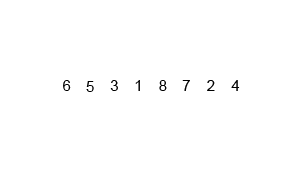Sequential Search
Search means finding the desired data among the data list
Sequential Search: Find the data you want by comparing the list one by one from the front
- Time complexity
- Worst case: when list length is n, it should be compared n times
- $O(n)$
- C++ example
#include<iostream>
#include<cstdio>
using namespace std;
bool sequentialSearch(int* data, int size, int key)
{
for(int i = 0; i < size; ++i)
{
if(data[i] == key)
{
return true;
}
}
return false;
}
int main()
{
int list_s[] = {5,4,3,2,1};
int len = sizeof(list_s) / sizeof(list_s[0]);
if(sequentialSearch(list_s, len, 3))
cout << "search success" << endl;
else
cout << "search fail" << endl;
}
Binary Search
Binary Search: Divide the data to be searched into half to search for the desired data
Divide and Conqure

- Binary search
- Divide: Divide the data list into two sublists
- Conqure
- data > Medium value: Search for the number to search in the sub-list at the back
- data < Medium value: Search for the number to search in the previous sub-list
Time Complexity
- Divide n lists in half every times and perform comparison operations k times until 1
- n X $\frac { 1 }{ 2 }$ X $\frac { 1 }{ 2 }$ X $\frac { 1 }{ 2 }$ … = 1
- n X $\frac { 1 }{ 2 }^k$ = 1
- n = $2^k$ = $log_2 n$ = $log_2 2^k$
- $log_2 n$ = k
- In big O notation, k + 1 is the final time complexity (even when it becomes 1, comparison operation is performed once)
- Eventually, $O(log_2 n + 1)$, 2 and 1, constant are deleted so, $O(log n)$
C++
#include<iostream>
#include<cstdio>
using namespace std;
void binarySearch(int* data, int left, int right, int key)
{
if(right < left)
{
cout << "search fail" << endl;
return;
}
int mid = left + (right-left)/2;
if(data[mid] == key)
{
cout << "search success" << endl;
return;
}
if(data[mid] < key)
binarySearch(data, mid+1, right, key);
else
binarySearch(data, left, mid-1, key);
}
int main()
{
int list_s[] = {2,5,8,12,16,23,38,56,72,91};
int len = sizeof(list_s) / sizeof(list_s[0]);
binarySearch(list_s, 0, len-1, 23);
binarySearch(list_s, 0, len-1, 10);
return 0;
}


